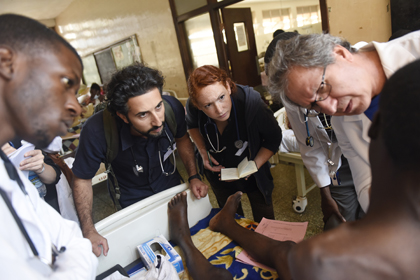December 7, 2016 by
Medical Communications
Student are fanning out across the globe to learn about the practice of medicine in a variety of countries, including Vietnam, Uganda, Zimbabwe, Dominican Republic, and Russia, via the UVM College of Medicine Western Connecticut Health Network Global Health Program.

(From L to R): Brian Beesiga, M.D., Sohi Ashraf, M.D., Mary Kate LoPiccolo '18 and Majid Sadigh, M.D., examine a patient during clinical rounds at Mulaga Hospital. (Courtesy Photo)
Student are fanning out across the globe
to learn about the practice of medicine in a variety of
countries, including Vietnam, Uganda, Zimbabwe, Dominican
Republic, and Russia, via the UVM College of Medicine
Western Connecticut Health Network Global Health
Program. They’re coming back with a new perspective on
global health care issues, and a more nuanced understanding
of their purpose as physicians. Not only do they gain a
deeper understanding of medicine across cultures, they
give back to hospitals, clinics, health care professionals, and
families along the way.
“For the last three years, our original focus on
enhancement of patient care through improvement of
medical education has become highly successful, with
the establishment of numerous comprehensive exchange
programs around the world,” says Majid Sadigh, M.D., UVM
associate professor of medicine and director of the UVM
WCHN Global Health Program.
In 2015-16, the program sent 24 students to five
partner sites. A sixth clinical site is under development in
China. Rising second-year students have the opportunity
for an elective the summer after their first year, with a
focus on research and clinical observation. Electives during
the fourth year focus more specifically on a specialty of
interest. Each global health rotation also includes sociocultural
immersion and language instruction.
U.S.-based faculty mentors accompany medical students
and residents for one to two weeks of their elective. Their
participation creates continuity and the medical supervision
needed to enrich the student and resident experience.
Sending faculty also helps to provide a key element in the
global health partnerships at the sites: capacity building and
education. Each faculty member who travels with the global
health program teaches classes to the local doctors, nurses
and other clinical staff at partner sites, as well as in the
community at locations like the Dominican Republic with a
strong focus on community health.
Another key component of the UVM/WCHN Global
Health Program is bi-lateral exchange: Not only do U.S.
students, residents and faculty spend time overseas, health
professionals from the partner sites come to the United
States as Scholars in Global Health at Danbury Hospital,
learning about the U.S. health care system and training.
The program is gaining recognition at the national level.
Since being accepted into the Consortium of Universities
for Global Health (CUGH), a worldwide organization of 130
academic institutions and other groups working to address
global health challenges, students and faculty have had
a strong presence at the annual conference. At the 2016
meeting in San Francisco, students and faculty presented
four posters, and five were presented the year before at the
annual meeting in Boston.
As College of Medicine students continue to complete
electives at the different affiliate sites, they bring home a new
appreciation for the complexity of their work, and a broader
understanding of the role physicians and other professionals
can play in fostering a truly global health care community.
For more information, visit the
Global Health Program website,
Global Health Blog, and the
Global Health at WCHN Facebook page.